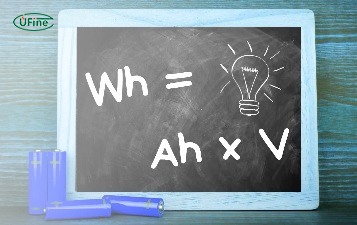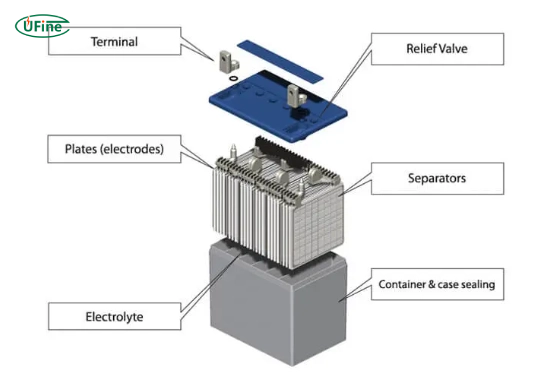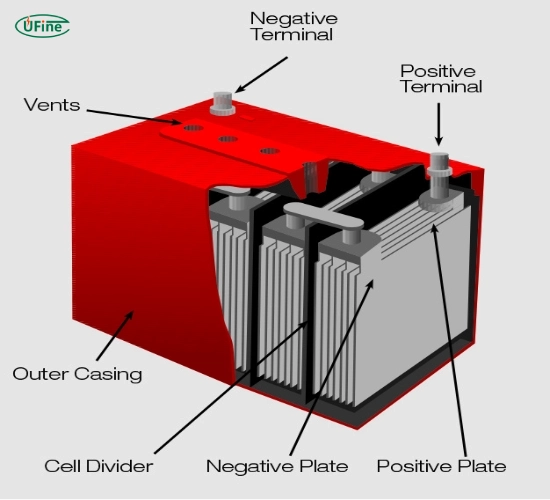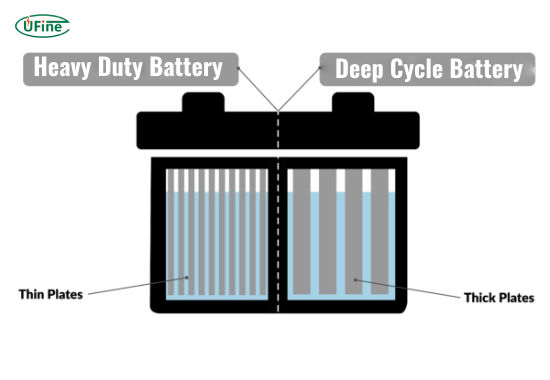
- Part 1. What is a heavy-duty battery?
- Part 2. What is a deep-cycle battery?
- Part 3. Heavy duty battery vs deep cycle: How do they differ in construction?
- Part 4. Heavy duty battery vs deep cycle: Which battery lasts longer?
- Part 5. Can you use a heavy-duty battery like a deep cycle?
- Part 6. Can you use a deep-cycle battery to start an engine?
- Part 7. Heavy duty battery vs deep cycle: Which is better for solar power?
- Part 8. Heavy duty battery vs deep cycle: What about price and value?
- Part 9. Heavy-duty vs. deep-cycle battery: Which battery should I choose for my RV or boat?
- Part 10. Heavy duty battery vs deep cycle: Which is easier to care for?
- Part 11. FAQs about heavy-duty batteries and deep-cycle battery
- Part 12. Summary
What is the real difference between a heavy-duty battery and a deep-cycle battery?
A heavy-duty battery is built to deliver a quick burst of high power, while a deep-cycle battery is designed to provide steady power over a long period. That’s the simple answer. But there’s much more you need to know to choose the correct battery for your needs.
In this guide, we’ll explain the key differences, real-world uses, pros and cons, and which is best for different applications, such as RVs, boats, solar setups, and off-grid living.
Part 1. What is a heavy-duty battery?
A heavy-duty battery is a type of starter battery. It’s made to deliver a high surge of current quickly. You need this to start engines, especially in trucks, buses, tractors, and other large machines.
These batteries are built with thin internal plates that allow fast energy discharge, but they’re not meant to be deeply discharged. In other words, you shouldn’t use them over a long period without recharging.
Typical uses of heavy-duty batteries:
- Starting diesel engines in trucks
- Powering construction vehicles
- Supporting backup generators
- Cranking marine engines
Part 2. What is a deep-cycle battery?
A deep-cycle battery is designed to deliver power slowly and steadily for an extended period. It can be discharged deeply (usually down to 50% or more) without damaging the battery.
These batteries have thicker plates and stronger internal components to handle repeated charging and discharging cycles. That’s why they’re perfect for off-grid solar systems, RVs, boats, and golf carts.
Typical uses of deep cycle batteries:
- Solar energy storage
- RV house batteries
- Marine trolling motors
- Electric wheelchairs
- Backup power systems
Part 3. Heavy duty battery vs deep cycle: How do they differ in construction?
The main difference lies in the internal structure.
- Heavy duty batteries: Thin plates, more surface area, high cranking amps. Not meant for deep discharges.
- Deep cycle batteries: Thick plates, less surface area, lower cranking amps. Designed for longevity and deep cycling.
The plate thickness is essential. Thin plates = high power, short time. Thick plates = steady power, long time.
Part 4. Heavy duty battery vs deep cycle: Which battery lasts longer?
Deep cycle batteries are the clear winner if you’re talking about lifespan in cycles.
- A good deep-cycle battery can last 500 to 1200 cycles, depending on how you use it.
- A heavy-duty battery might last 200 to 400 cycles if it is not discharged too deeply.
So, the deep cycle is the better choice if your goal is long-term energy storage.
Part 5. Can you use a heavy-duty battery like a deep cycle?
No, and you shouldn’t. While both are lead-acid batteries (in most cases), they’re built for very different purposes.
Using a heavy-duty battery for deep-discharge tasks will dramatically shorten its life. It’s like running a sprinter in a marathon—they’re just not made for that.
Part 6. Can you use a deep-cycle battery to start an engine?
Yes, but it’s not ideal. Some dual-purpose batteries are designed to handle both starting and deep cycling, but a pure deep cycle battery has lower cold cranking amps (CCA).
If your engine needs a strong jolt, a deep-cycle battery will not perform as well as a heavy-duty starter battery.
Part 7. Heavy duty battery vs deep cycle: Which is better for solar power?
Deep-cycle batteries are best for solar systems. They can handle:
- Regular charging and discharging
- Long periods without complete recharging
- Low levels of power over time
Heavy-duty batteries are unsuitable for solar storage—they’ll degrade much faster.
Part 8. Heavy duty battery vs deep cycle: What about price and value?
Here’s where things get interesting.
- Heavy-duty batteries are often cheaper upfront.
- Deep-cycle batteries are more expensive but last longer and provide better long-term value.
So, a heavy-duty battery might be enough for short-term use. But for serious power storage, deep-cycle batteries pay off in the long run.
Part 9. Heavy-duty vs. deep-cycle battery: Which battery should I choose for my RV or boat?
- RV house battery: Go with a deep cycle battery. You need steady power for lights, appliances, and electronics.
- RV engine battery: Use a heavy-duty starter battery.
- Boat trolling motor: Deep cycle all the way.
- Boat starting battery: Heavy duty is your best bet.
If space or cost is an issue, consider a dual-purpose marine battery, which won’t perform as well as specialized batteries.
Part 10. Heavy duty battery vs deep cycle: Which is easier to care for?
Both battery types need basic maintenance, especially if they’re flooded with lead acid. You’ll need to:
- Check water levels
- Clean terminals
- Avoid overcharging
However, AGM or lithium deep cycle batteries are maintenance-free and last even longer—but they have a higher price tag.
Part 11. FAQs about heavy-duty batteries and deep-cycle battery
Can I use a heavy-duty battery in a solar system?
No. Heavy-duty batteries are not built for deep discharge and will wear out quickly in a solar setup.
Are deep cycle batteries better for off-grid living?
Yes. Deep-cycle batteries are designed for long-term, steady use, perfect for off-grid solar and backup power.
How long do heavy-duty batteries last?
They typically last 1 to 3 years, depending on usage and maintenance. If misused, they can fail even sooner.
Can I charge both types of batteries the same way?
Not exactly. Deep-cycle batteries need slower, controlled charging, while heavy-duty batteries are more tolerant of fast charging. Use a smart charger that matches the battery type.
What’s the best battery for a campervan?
A deep cycle AGM or lithium battery is best for powering the living space. You’ll also need a starter battery for the engine.
Part 12. Summary
The key difference between a heavy-duty battery and a deep-cycle battery lies in how they deliver power:
- Heavy duty = quick bursts of power for starting engines.
- Deep cycle = slow, steady power for long-term use.
If you use batteries to start a vehicle or machine, go with heavy-duty. Deep-cycle is the way to go if you need storage for solar, RVs, or marine use.
Choosing the correct battery isn’t just about price. It’s about performance, lifespan, and how well it fits your needs. Now that you know the difference, you can make a smarter choice.
Related Tags:
More Articles

What are Watts and Watt Hours in Battery?
Understand watt vs watt-hour in batteries, how to calculate battery watt hours, and what Wh means for car batteries, devices, and energy storage.
A Complete Guide to the Best Batteries for Flashlights
Compare the best batteries for flashlights, including AA, AAA, 18650, 21700, CR123A. See which battery offers the best brightness, runtime, and reliability.
How Long Do Rechargeable AA Batteries Last?
How long do rechargeable AA batteries last? Compare NiMH and lithium AA lifespan, recharge cycles, key factors, and performance vs alkaline batteries.
How Much Current Can a 9V Battery Really Supply?
Discover how many amps a 9V battery can supply, its actual current output, discharge rate, and capacity for alkaline, lithium, and rechargeable 9V batteries.
12V STD vs 12V AGM: Meaning, Differences, and Which Is Better
Understand what STD and AGM batteries mean, their key differences, and which 12V battery fits your needs best in 2026.





